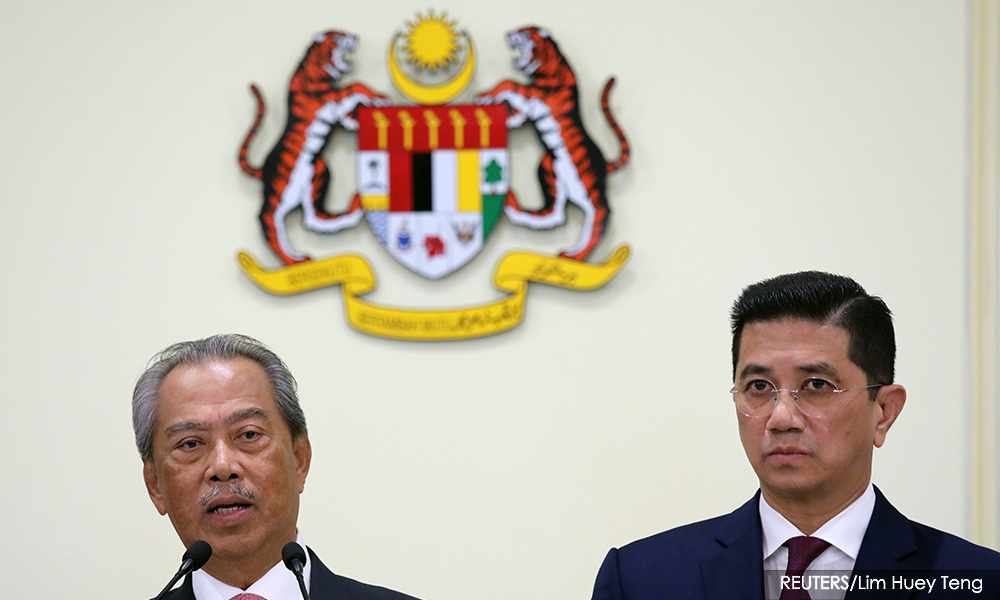Muhyiddin Yassin is not stupid. Anyone who could orchestrate the unprecedented, once-in-a-lifetime, ethically impossible task of the Sheraton Move could not be deemed stupid.
Although to the public, the chief architects of the Sheraton Move are called traitors, but within the government, they are deemed heroes. That is why Muhyiddin is prime minister, Azmin Ali the de facto deputy prime minister (senior minister with trade portfolio), and Home Minister Hamzah Zainudin.
This is a subtle admission that Sheraton Move was a triumph among political schemes. The rewards are given to those who pulled off the most difficult coup the country has ever seen.
But Sheraton Move was difficult not because it was intellectually or politically complex. It was difficult because it required a combination of qualities that most do not possess.
First, you need to be extremely selfish. To succeed, architects of the Sheraton Move had to prioritise coup-scheming for 22 months, from the day GE14 was decided. The sole purpose behind the coup was the selfish personal reasons of getting ministerial or GLC posts or additional political favours.
When they gathered at Sheraton Hotel the cursed night, they were “fantasising of picking this ministry or that.” By putting their jobs of serving the people on the back burner, you have to be extremely selfish to commit to the coup.
Second, you need to be highly irresponsible. The hardest part in pulling off the Sheraton coup was the need to ignore the people's wishes entirely. By throwing out most MPs and substituting with a group the people did not elect to government, you need to be highly irresponsible to defy the sacred democratic voices of the people in the largest election of the country.
Third, you need to be utterly mediocre. If you are genuinely dissatisfied with the government, the standard route is to force an election, where you persuade voters to dump the government and pick you instead. But if you know, at the back of your head, that you will not win because you are mediocre in comparison, then you have to resort to extra-ordinary methods like Sheraton Move to grab power. Instead of persuasion, planning, and policy, they resorted to positions and pockets.
These three dominant characteristics have made Sheraton Move possible. They are now contributing to the trinity of crises in Malaysia: a political crisis, an economic crisis, and a public health crisis.

Selfishness gave rise to a terrible political crisis
When you have taken something that does not belong to you, you always look over your shoulders for people to stab you and take it back. To overcome this intense insecurity, Muhyiddin’s government needed to isolate itself on an island. That is why they have declared the national Emergency and suspended the Parliament.
They are selfish in putting their personal interest of protecting power before the national interest of accountability and transparency. MPs could no longer ask questions about how the government spends, the logic of policy ideas, or the progress of implementation. Without Parliament, opposition MPs could not do their jobs. They only know about things through the news and could only write Facebook posts to question the government.
More important, consensus and unity could not be built among MPs, nor could the best ideas be heard through a formal setting. This is especially important during a crisis. By closing the doors of houses that belong to the people (Parliament and Putrajaya), they become insular and inaccessible.
This selfishness has festered within the government as well. The warring factions among Bersatu and Umno have too many competing interests – there are “too many cooks in the kitchen”. When the government is failing, Umno is the first to distance itself by claiming that they have never agreed to Perikatan Nasional’s policies in the first place. They absolve responsibility.
It is unsurprising, then, that policies are often inconsistent or downright contradictory because ministers in the cabinet are distrustful of each other. A government built by selfish individuals are naturally distrustful of one another.
Our country descends into a political crisis as ministers hate each other and do not cooperate, opposition and backbencher MPs are cast outside the system by a mute parliament, and the people are forgotten.

Irresponsibility gave rise to an economic crisis
The same irresponsibility of ignoring the people’s wishes during the Sheraton Move have contributed to one of the worst economic crises. As it stands, close to a million people are unemployed (unemployment rate at a 27-year high), at least 30,000 companies have shut down, and almost 1 in 2 people knows someone who has lost a job.
Young people are dragged into a lost generation where the youth unemployment rate is at its highest. Getting more and more desperate each day, young people choose to sacrifice their health for a job. And even if they get a job, they are paid only RM1,000 to RM1,500, percolating around the ungenerous minimum wage.
Against this dire background, the government’s response has always been overly optimistic or shamefully paternalistic.
Muhyiddin continues to ride on the high-growth-projection wave despite experts’ revision downwards and its worst economic performance since 1998 last year; the finance minister continues his “MCO-has-no-real-impact” narrative despite being proven wrong; our trade minister’s “largest trade surplus in 23 years” have, too, been exposed.
These are all symptomatic of the larger irresponsibility of not understanding what the people really need.
Every MCO that comes with RM2.4 billion losses per day must be coupled with economic stimulus packages that include cash transfers, loan moratorium, and subsidies, among others. If we are short of cash, we must borrow, especially when the interest rates are at historic lows.
Instead, what we get is: “What I am trying to say here is, we don’t have much money left. We don't have as much (money) as before… we should be able to manage ourselves better.”
An economic crisis descends when we reach historic levels of job losses and economic suffering, and we do not have bold leadership which listens to the people and act to stem its bleeding.

Utter mediocrity gave rise to a public health crisis
Lastly, the utter mediocrity in making critical decisions in a pandemic has given rise to a devastating public health crisis.
“Things are moving too slowly,” a senior member of Putrajaya said. The lack of decisive leadership akin to a wartime general was the reason behind the public health crisis.
The prime minister and the health minister have consistently downplayed the premonition of rising cases between October to December 2020 and only came to the terms for a need for tightening around January 2021.
By this time, senior healthcare officials wrote a letter to warn Muhyiddin that despite the government’s efforts, growing infections “are not decreasing”.
“Most of our ICU beds are very, very full… Even our non-ICU beds are reaching capacity,” said Dr Suan Ee Ong. A few weeks later, our healthcare system has reached a “breaking point”, nearing the point of deciding who shall live and who shall die.
Even at its more critical, policy communications were inconsistent and contradictory. While Muhyiddin had attributed the “ever-changing” SOPs to the “dynamism” of the virus, most U-turns are less Covid-related and more leadership-related.
Be it from the operations of kindergartens and childcare centres, the Chinese New Year SOPs changed less than three days it was released, “no outdoor exercise” rule changed within 48 hours, the non-closure of Hotspot Identification for Dynamic Engagement (Hide) areas to immediate closure, the need for police permission for cross-district vaccine appointments that was rebuked, or always-vague work from home orders.
All of this, together with widespread double standards, make compliance less effective.
Utter mediocrity may be passable under ordinary times, but in a crisis, it is a liability.
So, no, this government is not stupid. In fact, by calling it “stupid”, we imply unreasonableness to the criticisms, distract ourselves from the real character flaws, and absolve the PN government from the actual failures.
The trinity of three dominant characteristics has given us the trinity of crises. By being selfish, irresponsible, and utterly mediocre, we now have a political crisis, economic crisis, and public health crisis.
A few nights ago, banners started appearing across the country like wildfire. There is no banter, no humour, no playful ‘stupid government’ chide. They were white and plain, with a straight font that reads “Kerajaan Gagal”. - Mkini
JAMES CHAI is a legal consultant and researcher working for Invoke, among others. He also blogs at jameschai.com.my. You may reach him at jameschai.mpuk@gmail.com.
The views expressed here are those of the author/contributor and do not necessarily represent the views of MMKtT.



No comments:
Post a Comment
Note: Only a member of this blog may post a comment.